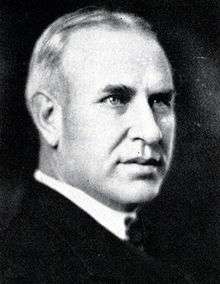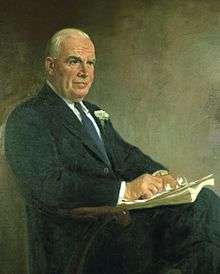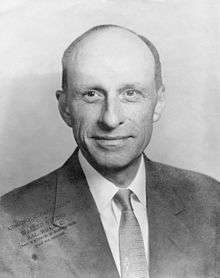Lieutenant Governor of North Carolina
| Lieutenant Governor of North Carolina | |
|---|---|
| Term length | Four years |
| Formation | 1868 |
| Salary | $124,676.00 (2013)[1] |
| Website | www.ltgov.nc.gov |
The Lieutenant Governor of North Carolina is the second highest elected official in the U.S. state of North Carolina and is the only elected official to have powers in both the legislative and executive branches of state government. The current Lieutenant Governor is Dan Forest, a Republican.
As of 2008, the administrative offices of the Lieutenant Governor are located in the historic Hawkins-Hartness House on N. Blount Street in Raleigh's Government District. The Lieutenant Governor also maintains an office at the nearby North Carolina State Legislative Building. At one time, the Lieutenant Governor had an office in the North Carolina State Capitol.[2]
Duties and powers
The office of Lieutenant Governor was created by the North Carolina Constitution of 1868. Just as the Vice President of the United States presides (albeit rarely) over the United States Senate, the lieutenant governor's primary responsibility is to preside over the North Carolina Senate; until 1970, this was the lieutenant governor's only major responsibility, and the position was only part-time. The position is now a full-time job.
By virtue of the office (Ex officio), the lieutenant governor is a member of the North Carolina Council of State, the North Carolina Board of Education, the North Carolina Capital Planning Commission, and the North Carolina Board of Community Colleges, and serves as the Chairman of the eLearning Commission.[3]
From 1868 through 1977, the lieutenant governor, like the governor of North Carolina, was limited to a single four-year term. In 1977, the North Carolina Constitution was amended to allow both the governor and the lieutenant governor to serve two consecutive terms.[4]
Succession to office of governor
The lieutenant governor is the first official in line to succeed the Governor of North Carolina, should that office be vacated. This has occurred five times in the history of the office; four of the first six lieutenant governors were promoted upon the death, impeachment, or resignation of the previously sitting governor.
Lieutenant governors have often run for governor, but few have been successful. Jim Hunt, elected governor in 1976, and Beverly Perdue, elected governor in 2008, are the two most recent exceptions.[5]
The lieutenant governor is elected on a separate ballot from the governor; therefore, it is theoretically possible that the governor and lieutenant governor may be of different political party affiliations. This has happened twice in North Carolina since the 1977 constitutional amendment, once from 1985 to 1989, and during the present 2017 to 2021 term.
List of lieutenant governors
- Parties
- Notes
- ↑ Became Governor on December 20, 1870.
- ↑ Robinson is often referred to as "acting Lieutenant Governor" from 1879 through 1881, because, as President Pro Tempore of the Senate at the time that Jarvis succeeded to the governorship, he became President of the Senate, putting him next in line to succeed the governor. However, technically, there is no such office as "acting" lieutenant governor, meaning that the office was vacant, just as it had been in periods such as 1874-1877. Robinson was elected lieutenant governor in his own right in 1880.
- ↑ Died in office.
- ↑ First Lt. Governor to serve two terms.
- ↑ First Republican elected since Reynolds in 1896.
- ↑ First female Lt. Governor.
See also
North Carolina Lieutenant Governor Elections: 1996, 2000, 2004, 2008, 2012, 2016
Living former Lieutenant Governors of North Carolina
As of January 2017, seven former lieutenant governors of North Carolina were alive, the oldest being Hoyt Patrick Taylor, Jr. (served 1969–1973, born 1924). The most recent death of a former lieutenant governor of North Carolina was that of Robert W. Scott (served 1965–1969, born 1929), on January 23, 2009. The most recently serving lieutenant governor to die was James C. Green (1977-1985), on February 4, 2000.
| Lt. Governor | Lt. Gubernatorial term | Date of birth (and age) |
|---|---|---|
| Hoyt Patrick Taylor, Jr. | 1969–1973 | April 1, 1924 |
| James B. Hunt, Jr. | 1973–1977 | May 16, 1937 |
| Robert B. Jordan, III | 1985–1989 | October 11, 1932 |
| James Carson Gardner | 1989–1993 | April 8, 1933 |
| Dennis A. Wicker | 1993–2001 | June 14, 1952 |
| Beverly Eaves Perdue | 2001–2009 | January 14, 1947 |
| Walter H. Dalton | 2009–2013 | May 21, 1949 |
References
- ↑ "CSG Releases 2013 Governor Salaries". The Council of State Governments. June 25, 2013. Retrieved November 23, 2014.
- ↑ News & Observer: Homeless lt. governors, next on Oprah? Archived 2009-02-28 at the Wayback Machine.
- ↑ eLearningNC
- ↑ NC Government Records Branch
- ↑ News & Observer: A curse on lieutenant governors? Archived 2008-10-23 at the Wayback Machine.

























.jpg)




